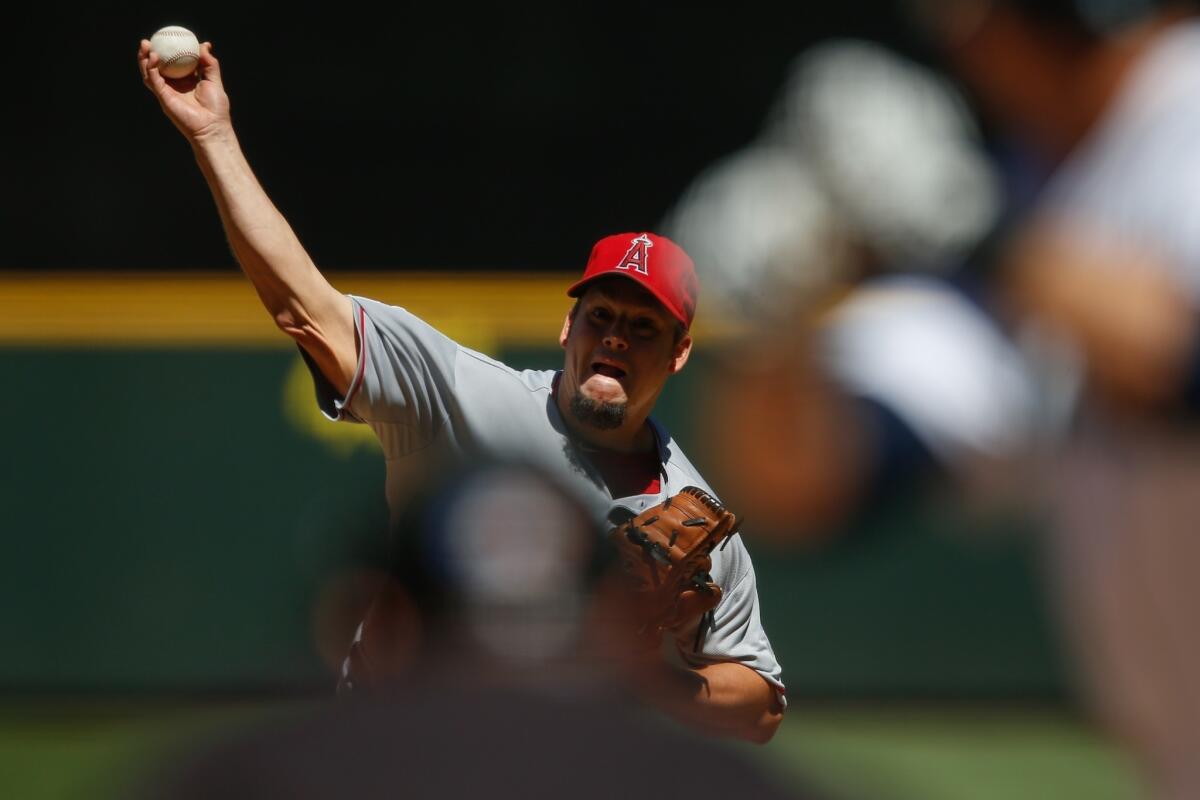Don’t let Joe Blanton into the 20-loss club; he’s not good enough

If the Angels don’t act soon Joe Blanton might end up Major League Baseball’s first 20-game loser since 2003 — and the worst 20-game loser of all time.
Blanton, whose record is 2-13, would bring ignominy to a fraternity that has actually received a bum rap through the years.
It used to be you had to be pretty good, even great, to be allowed to lose 20 games.
A pitcher they later named an award after, Cy Young, lost 20 games or more three times. Steve Carlton lost 20, and so did Mickey Lolich, Luis Tiant, Jerry Koosman, Randy Jones, Denny McLain, Mel Stottlemyre and some stiff named Walter Johnson.
How could Blanton get by the bouncers in this club?
Phil Niekro and Wilbur Wood each lost 20 games in a season — twice.
Brickyard Kennedy, who died in 1915, would roll over in his grave knowing Blanton was entering this exclusive domain. Kennedy pitched his formative years for the Brooklyn Grooms and lost 20 or more games five times in his 12-year career.
Yet, Kennedy hung up his spikes with Pittsburgh in 1903 with a career record of 187-159 and an earned-run average of 3.96. That would make him the No. 1 starter in many of today’s rotations.
Blanton should be removed from the Angels’ rotation if only out of respect for the 20-something club. Blanton is not even worthy to serve as this academy’s master-at-arms.
Losing 20 games used to be fairly easy before agents and the players’ union turned pitchers into delicate pieces of peanut brittle available for work every fifth or sixth day.
The money is too big now to risk frontline starters earning enough decisions to have a record like Lolich’s for Detroit in 1974, when he went 16-21.
There are fewer 20-game winners now but fewer still 20-game losers.
Four hundred and ninety seven pitchers lost 20 games or more between 1872 and 1979, according to BaseballReference.com. The first two were Candy Cummings of the New York Mutuals and Jim Britt of the Brooklyn Atlantics.
Britt followed his 28-loss campaign of 1872 by going 17-36 the following year. Atlantics Manager Bob Ferguson — a distant relative of Angels Manager Mike Scioscia? — kept saying Britt was one quality start from turning the corner.
The number of 20-game losers since 1980: Two.
Brian Kingman infamously went 8-20 for Oakland in 1980 but also finished with 10 complete games and a respectable ERA of 3.83. Detroit’s Mike Maroth was the last 20-game loser, finishing 9-21 a decade ago.
Think about that: Blanton would have to go 7-8 down the stretch to match that mark ... and the Angels would be so thrilled they might extend his contract two more years!
Twenty-game losers used to be warriors. Denton True “Cy” Young lost 22 games in 1891 but won 27 with an ERA of 2.85. Young also led the American League with 21 defeats in 1906, when he had an ERA of 3.19.
Rest assured no one is going to name an award for what Joe Blanton is doing. He’s so affiliated with “homer” this year his nickname should be “Ulysses.”
In fact, James Ulysses Hughey, who set the bar low when he went 4-30 for the Cleveland Spiders in 1899, had a better ERA than Blanton — 5.41 to Joe’s present 5.66. And we’re pretty sure he never said he “threw the ball fine today” after a game in which he gave up nine hits in 32/3 innings.
Chances are the Angels won’t allow Blanton to lose 20, and that’s a good thing. In fact, Scioscia on Tuesday refused to say whether Blanton would make his next scheduled start.
The 20-loss club should be reserved for Hall of Famers like Robin Roberts, great enough to go 10-22 in 1957.
Letting Blanton in would be unfair to the likes of “Happy” Jack Chesbro (14-20 in 1908) and “Sad” Sam Jones (20 defeats in 1919 and 1925).
The Angels need to get smart and pull Blanton from the rotation, if only to protect and preserve the dignity of Dummy Taylor’s 18-27 year of 1901.
More to Read
Go beyond the scoreboard
Get the latest on L.A.'s teams in the daily Sports Report newsletter.
You may occasionally receive promotional content from the Los Angeles Times.











